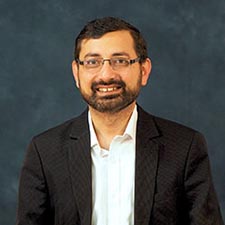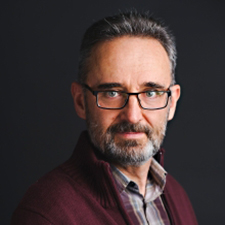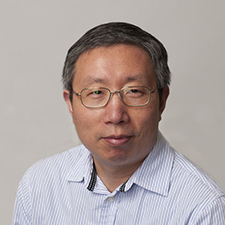Proceedings of the 7th International Conference
on Theoretical and Applied Nanoscience and Nanotechnology (TANN 2023)
June 01 - 03, 2023 | Carleton University, Ottawa, Canada
The Plenary & keynote information for the 7th International Conference of Theoretical and Applied Nanoscience and Nanotechnology (TANN 2023) is as follows:
Plenary Speaker

Dr. Aicheng Chen
University of Guelph, Canada
Keynote Speakers

Dr. Muhammad Imran
University of Glasgow, UK

Dr. Zoran Miskovic
University of Waterloo, Canada

Dr. Dejian Zhou
University of Leeds, UK

Dr. Aicheng Chen
University of Guelph, Canada
Aicheng Chen is Professor of Chemistry, Tier 1 Canada Research Chair in Electrochemistry and Nanoscience, and Director of the Electrochemical Technology Centre at the University of Guelph. His research interests span the areas of Electrochemistry, Photoelectrochemistry, Green Chemistry, and Nanoscience. He has published 270 peer-reviewed journal articles and book chapters. For his accomplishments, Prof. Chen has received a number of awards, including the Ontario Premier’s Research Excellence Award, the Japan Society for the Promotion of Science Invitation Fellowship, the Lash Miller Award and the R.C. Jacobsen Award of the Electrochemical Society Canada Section, the Fred Beamish Award, the Keith Laidler Award and the W.A.E. McBryde Medal of the Canadian Society for Chemistry, the Canadian Catalysis Lectureship Award, and the RBC Innovation Award. He has also been named as Fellow of the Chemical Institute of Canada, Fellow of the Royal Society of Chemistry (UK), Fellow of the International Association of Advanced Materials, and Fellow of the International Society of Electrochemistry.
Topic of Plenary: Design and Electrochemical Study of Nanomaterials for Green Chemistry and Sensing Applications

Dr. Muhammad Imran
University of Glasgow, UK
Prof. Muhammad Ali Imran, based at the University of Glasgow, is a renowned international leader in the field of communication systems. With over 20 years of combined academic and industry experience, he has made pioneering contributions in the areas of self-organized cellular networks and energy-efficient communications, which have been widely cited, incorporated into standards, and adopted commercially. As the Principal Investigator for Scotland 5G Centre’s urban testbed, Prof. Imran is at the forefront of cutting-edge research in 5G technology. He also leads a large research group with over 100 researchers in Scotland, and has played key roles in multi-million pound funded projects, serving as a consultant to international projects and local companies in the field of self-organised networks and 5G technology use cases.
In addition to his research accomplishments, Prof. Imran is an international promoter/ambassador for the UK’s Higher Education sector, having successfully led transnational education initiatives. He is recognized with honors such as FIEEE, FIET, FRSE, FRSA, FEAI, and Senior Fellow HEA, showcasing his excellence in the field. Beyond his professional achievements, Prof. Imran is deeply passionate about sharing the benefits of technology equitably across society and is committed to mentoring young talent. His work reflects his dedication to advancing the field of communication systems and promoting the positive impact of technology on society.
Topic of Keynote: Applied Nanoscience and Nanotechnology for Digital Connectivity

Dr. Zoran Miskovic
University of Waterloo, Canada
Zoran Miskovic obtained a PhD degree in Engineering Physics from the University of Belgrade, Serbia, in 1991 and he joined the Department of Applied Mathematics of the University of Waterloo, Canada, where he is now a professor of Mathematical Physics. His research is generally concerned with mathematical modeling and computational simulation of physical processes taking place when nanometer-sized structures interact with the surrounding media and with external probes. He currently focusses on modeling the interaction of heterostructures involving 2D materials with external charged particles in the context of the electron microscopy for applications in the areas of nano-plasmonics and nano-photonics, as well as on modeling electrochemical systems with graphene-based electrodes for applications in biochemical sensing and the capacitive energy storage. Besides research collaboration with several theoretical groups worldwide, he also collaborated with several experimental groups. He has published over 170 peer-reviewed articles, some of which appeared in journals like Nano Letters, Carbon, ACS Photonics, Nanoscale, Electrochimica Acta, Nanomaterials, etc.
Topic of Keynote: Theoretical Modelling of Interactions of Moving Charged Particles with Two-Dimensional Materials

Dr. Dejian Zhou
University of Leeds, UK
Dejian Zhou is Professor in Nanochemistry, Fellow of the Royal Society of Chemistry (FRSC) and PI member of School of Chemistry, Astbury Centre for Structural Molecular Biology and Bragg Centre for Materials Research, University of Leeds. He obtained his BSc and PhD degrees in Chemistry both from Peking Univ. (China) in 1990 and 1995, respectively. He pursued postdoctoral research at Cranfield (1997-00) and Cambridge (2000-07) before being appointed to a Senior Lectureship (2007), and then promoted to full Professor of Nanochemistry (2018) at Leeds. He is pursuing a polyvalent multifunctional nanoparticle (PMN) strategy to address some important unmet biomedical challenges, e.g. novel glycan-PMNs for probing biophysical and structural mechanisms of multivalent protein-sugar interactions for potential therapeutic interventions, as well as new multi-ligand functionalised PMNs for anticancer and antibacterial applications. He received the Chinese Chemical Society Young Chemist Award (1996) and serves as an associate editor or editorial board member for several Elsevier on Wiley journals. He has published >150 peer-reviewed journal papers, including >30 in leading high impact journals (IF >10, e.g. Nature Nanotech, J. Am. Chem. Soc., Angew. Chem., Adv. Mater. etc) and two research highlights on the BBC.
Topic of Keynote: Developing a Polyvalent Multifunctional Nanoparticle Strategy to Address Some Biological and Biomedical Challenges